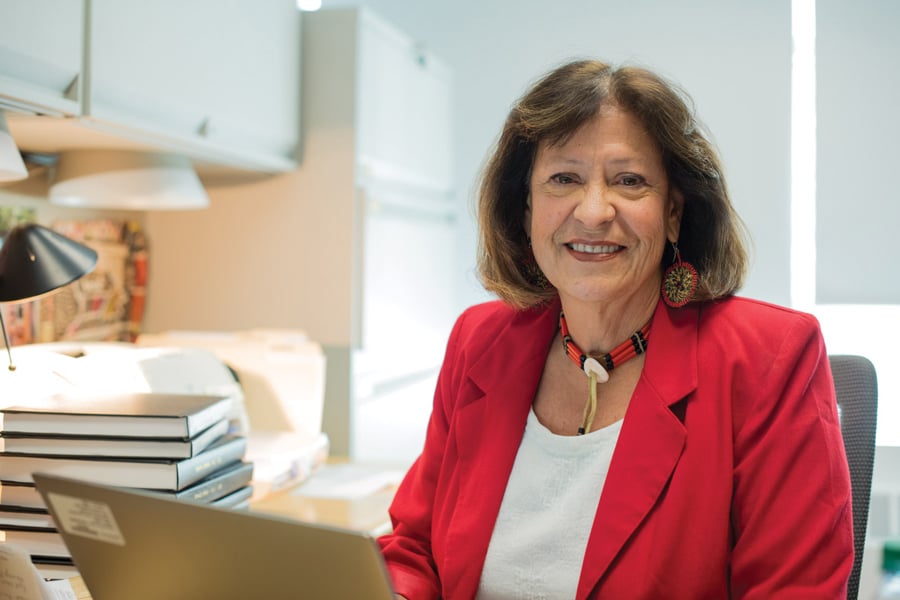Weinberg to create Native American and Indigenous Studies minor
(Katie Pach/Daily Senior Staffer)
Medill Prof. Patty Loew is the director for the new Center for Native American and Indigenous Research. Loew, along with other faculty and administrators, is working to create a Native American and Indigenous Studies minor, which she said will be available within two to three years.
September 28, 2017
Medill Prof. Patty Loew, director of the new Center for Native American and Indigenous Research, said she is working with other faculty and administrators to establish a Native American and Indigenous Studies minor.
Loew, who is a member of the Bad River Band of Lake Superior Ojibwe, said she is “very confident” that the minor will be available through the Weinberg College of Arts and Sciences within the next two to three years.
“There’s enough will here, certainly among affiliated faculty at the center,” said Loew, who was named CNAIR’s inaugural director this month. “I can safely say we’ve received a lot of encouragement and support from people at leadership positions in the college.”
The first step, Loew said, is to identify and categorize all courses related to Native American and Indigenous Studies.
Currently, there are more than enough classes to meet the six-course requirement for a minor, Loew said, but they are not grouped together in any official way. For example, the center’s website identifies 11 relevant courses offered this quarter, but they are listed under different departments like anthropology, sociology and global health.
The minor will help show students the “breadth” of Native American and Indigenous Studies, said sociology Prof. Beth Redbird, who is also affiliated with the center.
Redbird said the minor will attract students and faculty from a variety of disciplines.
“You can have people in environmental sciences who talk about traditional medicines; you can have people in religious studies who talk about traditional religions,” said Redbird, who is an Oklahoma Choctaw. “You can have language, you can have art, you can have culture. … There’s almost something for everybody.”
Loew said she anticipates applicable classes will be labeled on CAESAR as Native American and Indigenous Studies courses in time for Spring Quarter registration.
She said she is also developing a stronger “roadmap” to guide students so the minor isn’t just a “basket of courses.” Right now, she said, the plan is to require a central core of introductory courses. After that, students will branch out into four different sectors, including creative expression; history, politics, law and media; and science, technology and health.
Loew said the fourth sector, global indigeneity, will involve studying the experiences of indigenous peoples worldwide.
The University may hire additional indigenous faculty for the minor’s courses, Loew said. Increasing indigenous faculty would benefit the University, Redbird said, by attracting more indigenous students, who could help share NU’s research with Native communities.
Weinberg sophomore Lois Biggs, co-president of NU’s Native American and Indigenous Student Alliance, said NAISA has advocated for the minor’s creation for years. The minor will provide a home so students don’t have to “dig” for Native-related courses or create adjunct majors and minors, she said.
“To have this as an option for incoming students is really exciting,” said Biggs, who is White Earth Ojibwe and Oklahoma Cherokee. “We hope … the administration will keep following through on these steps that we think are really important to continuing to support the indigenous community on campus.”
The minor will give students an advantage in the job hunt, Loew said, because today’s employers are looking for recruits who have more “cultural sensitivity.”
Additionally, she said, the minor will give students the tools to be better citizens of a “pluralistic” society.
“Someone who has a minor in Native American and Indigenous Studies walks away understanding the world in a more holistic way,” Loew said. “We can pretty much all agree that understanding restraint [and] tolerance is something that is sorely needed right about now.”
Email: madelineburakoff2020@u.northwestern.edu
Twitter: @madsburk



